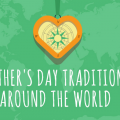Damned if you do and damned if you don’t…
 As a Mum to two daughters (two and four years old), wife and entrepreneur, I’m brutally aware of the mix of emotions that seem to come as standard. From the moment I gave birth, the guilt kicked in with incredible force, and talking to other mums (working and stay-at-home alike) it seems that I am not alone.
As a Mum to two daughters (two and four years old), wife and entrepreneur, I’m brutally aware of the mix of emotions that seem to come as standard. From the moment I gave birth, the guilt kicked in with incredible force, and talking to other mums (working and stay-at-home alike) it seems that I am not alone.
I went back to work five months after giving birth to my first daughter and after six months for my second daughter. I had help with childcare form parents and husband. From the age of two my daughters attended a Montessori nursery giving me a chance to work more. I worked an average of 30 hours per week spilling into evenings and weekends, which proved exhausting and stressful at times, but allowed me to grow my business while spending time with my children.
The grass is always greener on the other side. I have friends who are stay-at-home mothers and sometimes I get a pang of jealousy at the school gates when I hear their plans to go for lunch, or to get on top of the household chores. Stay-at-home mothers occasionally look at working mums with a smidge of envy during the ‘terrible two’ phase (I know, I sometimes went to work for a break during those tantrum episodes!).
Surely the entire point of feminism is that women should be able to choose their own path, free from criticism and finger pointing? If we’re trying to do right by ourselves, our family and our life choices, and it doesn’t hurt anyone else, what is so wrong with that? Sadly, there will always be critics.
According to Dr Aric Sigman, a biologist and psychologist, speaking recently at Mothers At Home Matter conference, stay-at-home mothers are increasingly facing a damaging but unspoken prejudice that assumes they are stupid, lazy and unattractive.
Hedge fund billionaire Paul Tudor Jones, on the other hand, believes that there will never be “as many great women investors or traders as men — period, end of story” because women have babies, which become a “focus killer”.
So you’re damned if you do and damned if you don’t…
The research findings for John Gerzema’s new book, The Athena Doctrine, suggest that the new leader of a modern economy does not look like a macho, winner-take-all guy, but a reasoned, nuanced executive who creates value by taking the long view. Seventy-six percent of people in the survey said, “in general, women are more patient and able to plan for the future“. And when asked to articulate traits of exemplary modern leaders, patience, selflessness, collaboration and humility were highest correlated and seen as more feminine. Pride, aggressiveness and independents were the least correlated and considered most masculine.
Jenny Garrett, author of Rocking Your Role, says: “Motherism is an interesting term and comes from a situation where women can now exercise choice. For many years working women have felt the need to justify their role as earners. Now, when they are in the majority, it seems that stay-at-home mums are feeling the need to do the same. I don’t believe that there is a backlash against stay-at-home mums but I do believe, just like any minority, they will experience a sense of otherness and in today’s society identity is often wrapped up in work role.” Jenny continues, “Sadly it has always been difficult for stay-at-home mums to help others see the value of their role. The rise of stay at home dads may rectify this as men are often very good at highlighting their contribution.”
Motherism prejudice hits stay-at-home mums where it hurts and working mums criticised for parenting approach and “lack of focus“. Can women ever win this war? Ultimately shouldn’t we, as Jenny says, ”be celebrating that women have choices now”?






